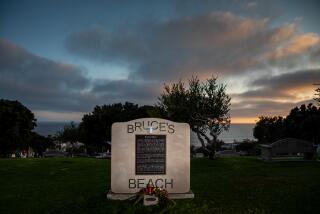Deep-Pockets System: Welfare, Not Justice
Twenty-two years ago I commenced the study of the foreign language of “legalese.” I learned that in the hands of a skilled lawyer there is virtually no legal position that cannot somehow be defended, or attacked.
The powerful trial lawyers’ lobby has been masterfully employing legalese to muster opposition to Proposition 51, known as the “deep-pockets” initiative, hoping that California voters will not change the system that has made it such an economic force.
For the record:
12:00 a.m. June 27, 1986 For the Record Antioch Traffic Crash Is Clarified
Los Angeles Times Friday June 27, 1986 Home Edition Metro Part 2 Page 5 Column 1 Op Ed Desk 6 inches; 187 words Type of Material: Correction
On May 30 The Times published an article by attorney James M. Galbraith about Proposition 51. While analyzing the merits of the proposition, Galbraith summarized a fatal traffic accident in Antioch, Calif., widely reported by the measure’s proponents and the press.
The article described a “speeding car full of beer-drinking teen-agers” that crashed into a pole, killing one passenger and severely injuring two others. It also reported that the driver had been convicted of manslaughter.
Although the driver was not identified by name, he and his parents have now filed a libel suit against The Times and demanded a retraction.
It was incorrect to say that he was convicted of manslaughter. The court record, which was obtained by The Times by court order, shows that the driver violated a misdemeanor manslaughter provision of the state penal code, but the case was later dismissed “in the interest of justice.” Charges of reckless driving and felony manslaughter were not sustained.
A blood test administered a few hours after the accident showed no alcohol in the driver’s blood. Beer was found at the scene of the accident, but only one bottle was open and it belonged to the young man who died, according to the police report. The driver later testified in a deposition in a civil suit that he had consumed “part of a beer” before driving.
The coalition of businesses, municipalities and insurance companies sponsoring the initiative submits that it is not fair that defendants pay damages when they are at fault only in the most remote sense. Under the doctrine of “joint and several liability,” introduced to California law by the present Supreme Court under Rose Elizabeth Bird, a defendant found to be even 1% at fault can be made to pay 100% of the damages if those who are primarily at fault have no money. Plaintiffs’ lawyers have since frequently demonstrated an ability to prove that anyone is at least 1% at fault for just about anything. Their legal ability, in fact, has panicked defendants into settling cases that in years past would have been laughed out of court.
The latest example that the coalition points to is a tragic accident in Antioch. A speeding car full of beer-drinking teen-agers crashed into a light pole, killing one passenger and severely injuring two others. The driver was convicted of manslaughter. Clearly he was at fault, but he was not a deep-pockets defendant with large financial resources or insurance to pursue. But enterprising lawyers developed cases against the city of Antioch, a nearby shopping center and even the utility company that owned the light pole. Faced with multimillion-dollar jury awards if found even marginally at fault, the defendants settled for $850,000.
To the average citizen, the Antioch case is astonishing. But to anyone familiar with California’s judicial system, it is commonplace. Longstanding efforts to reform the system have stalled. A reform bill did pass the Senate but was blocked in the Assembly Judiciary Committee by the California Trial Lawyers Assn., the state’s single largest contributor of campaign funds. Proponents of reform were left to take their case to the people through the initiative process.
Trial lawyers actively oppose the initiative, arguing that needy victims could be left with no one to pay damages. This argument has defused reform efforts in the past, so Proposition 51’s drafters have provided for continued recovery of all actual damages, such as medical bills and lost earnings, on a joint-and-several basis. Only pain-and-suffering awards, which have soared in recent years, would be limited to a defendant’s actual percentage of fault.
The trial lawyers are pursuing other lines of attack. They are supporting relief for municipalities in the Legislature, hoping to remove them from the initiative’s coalition. They employed a Washington consulting firm, which helped defeat a similar measure in Florida, and are spending about $6 million attacking the ulterior motives of businesses and insurance companies. “As much as people hate lawyers,” a spokesman says, “they also hate insurance companies.” They count on unions and consumer groups for support.
Notwithstanding the simplistic and often-misleading statements of opposition to Proposition 51, the deep-pockets approach to justice in California has too often become a means of rewarding needy plaintiffs rather than allocating legal responsibility. This has led to some to some senseless results. For example, the designer of a phone booth was held liable to a customer when a drunk driver crashed into the booth. Not surprisingly, insurance premiums necessary to pay such liabilities are skyrocketing, if coverage is available at all.
How do Proposition 51 opponents defend the deep-pockets system? Harvey Rosenfeld, a Ralph Nader associate and skilled in legalese, states the case: “The whole idea of our legal system is to make the person whole. By denying people full recovery for non-economic damages, you are saying ‘we are not going to make your life any better.’ ” By assuming that the purpose of the legal system is to make people whole, or to make their life better, he artfully focuses the attention of his audience only on who is to pay. But any student of the Anglo-Saxon judicial system knows that it historically assessed damages only when caused by the fault of the defendant, not when a deep-pockets defendant could better afford to pay than a needy plaintiff.
The ease of access to our courts to all who have a legitimate grievance should not be impaired. But a system that penalizes innocent bystanders to aid needy victims dispenses not justice but welfare. The accident in Antioch, no matter how tragic, should have been a matter between the passengers and the driver. California’s deep-pockets system forced the other defendants in that case to settle on a senseless basis. On Tuesday, California voters have an opportunity to reject the legalese defense of the present system by trial lawyers and strike a blow for common sense.
More to Read
Sign up for Essential California
The most important California stories and recommendations in your inbox every morning.
You may occasionally receive promotional content from the Los Angeles Times.









